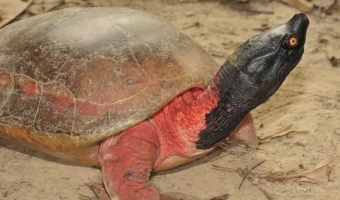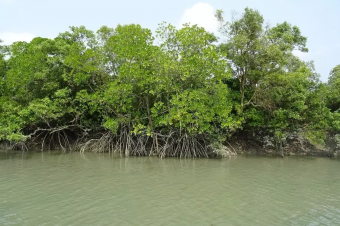
Some of the rarest turtles in the world have been brought back from the brink of extinction.
The Northern River Terrapin (Batagur baska) is a freshwater turtle once common in the waterways of southwest India, Bangladesh and Myanmar. It has been considered a local delicacy, which is what led to them being hunted until only a few individuals remained in captivity.
But ten years ago, a team from Vienna’s Schönbrunn Zoo, working with conservation groups and Bangladesh’s Forest Department, launched a project which has seen the terrapins successfully reintroduced into the mangrove forests of the Sundarbans on the country’s south coast.
Black market traders
The project started when local conservationist Rupali Ghosh bought a terrapin dealer’s entire stock to save them from slaughter.
Females are traditionally the most prized for their meat. “Fishermen can get up to $365 for a female – that’s twice the average monthly wage in Bangladesh,” says the Zoo’s turtle project leader Doris Preininger. “They are often kept as talisman’s in village ponds. Traders can get three times that amount by selling the meat and the shells on the black market,” she adds.
They are believed to live for up to 100 years, grow up to 60 centimetres long, weigh up to 20 kilogrammes and, as one of the most endangered species of turtle in the world, are protected by the Convention on International Trade in Endangered Species of Wild Fauna and Flora.
Today, the project is producing 250 hatchlings at its nursery in Bhawal National Park. When the terrapins are old enough, they are taken to the coast and released.
More:
Hunters turned helpers
Once in the wild, the terrapins face predation by another endangered species – the Sundarbans National Park is home to one of the world’s largest populations of Bengal tigers.
But the terrapins now have some unlikely human allies in their fight for survival. Local fishermen, who once hunted the freshwater turtles, are now employed to help protect them. They are part of a team who have helped make this a successful species conservation project.
Not that it’s all been plain sailing. The terrapins are still caught as by-catch in fishermen’s nets and are still being hunted for international trade. Even in their nursery, they are under threat.

“We have only eight females because they are very expensive,” says centre manager AGJ Morsched. “People have broken into the station and one of the keepers was beaten up trying to stop people getting in.”
The good news is the released terrapins are putting on weight – which proves they are feeding successfully – and extending their range. Juveniles have also been found, suggesting they are breeding again in the wild.
Tipping point
The World Economic Forum’s Future of Nature and Business report said the economic recovery from COVID-19 must focus on protecting nature, arguing that commercial interests were not immune from the threats to the natural world.
“There is no future for business as usual – we are reaching irreversible tipping points for nature and climate, and over half of the global GDP, $44 trillion, is potentially threatened by nature loss,” it said.
Source: World Economic Forum



